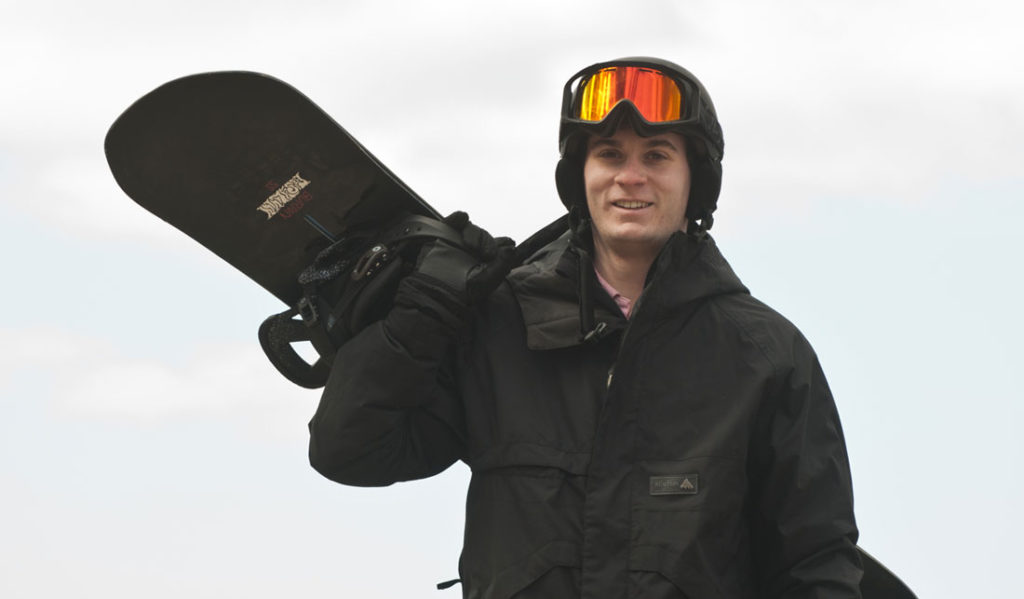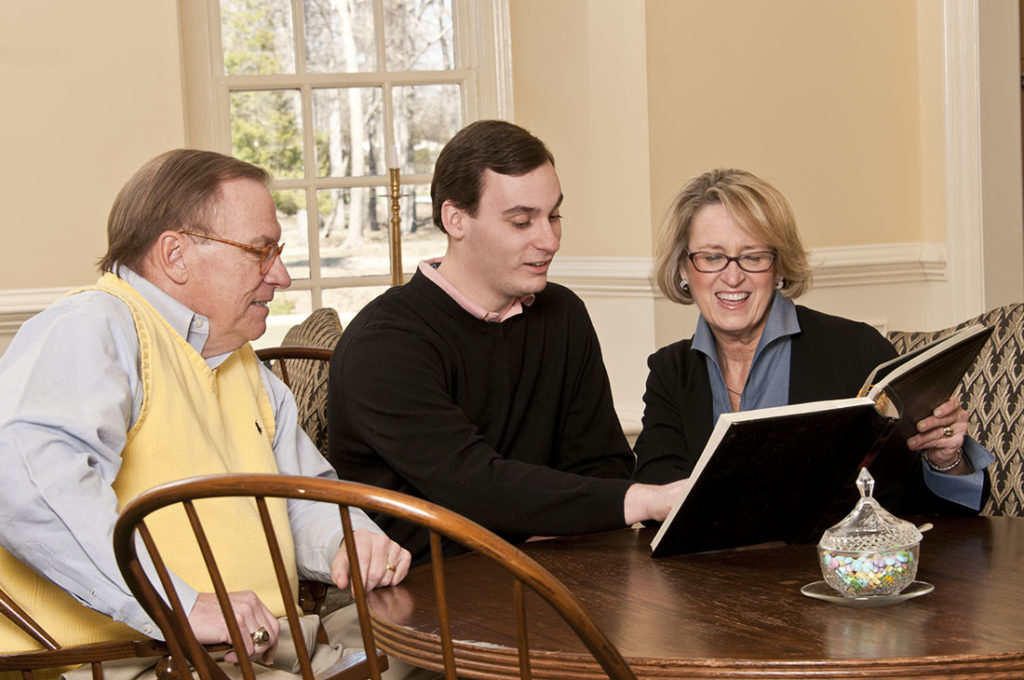Wyatt
Facing the Challenge of Bipolar Disorder
“Snowboarding and golf, that’s me,” says 21-year-old Wyatt M. His dad took him to snowboard in the Blue Ridge mountains north of their home in Richmond, VA, when we was 12. Now a student at Virginia Commonwealth University, Wyatt spends almost every winter weekend snowboarding with his friends. “I’m not great, but I get a little better with each run.”

“Snowboarding and golf, that’s me.”
Just two years ago, Wyatt was not focused on snowboarding. He was focused on recovery. After spending his summer preparing to transfer to the Virginia Military Institute (VMI), Wyatt planned a trip to visit his older brother, Hunter, in North Georgia. Wyatt’s parents were shocked when Hunter called them describing Wyatt’s erratic behavior.
“It was beyond terrifying,” Wyatt’s mom, Beth, says. “Hunter called us and said ‘what should I do, Wyatt is jumping on his car.’”
Their first thoughts were for the boys’ safety; their second concern was protecting Wyatt’s future.
“In that split second all I could think of was, if we call the police, he won’t be going to VMI. Every dream, hope and aspiration that you have had and your child has had – in that split second it is gone.”
Wyatt broke the phone and took off in his car—crashing into a nearby house. Wyatt ended up first in jail, then in a hospital where drug use was ruled out. He was taken to a mental health hospital in Atlanta. He was experiencing psychosis as part of an episode of mania in what doctors diagnosed as bipolar disorder II. The family was overwhelmed and knew Wyatt desperately needed help.
“I knew what was going on, and I knew I was going to get through it,” Wyatt says. “At that time, I wasn’t worried about school or anything, just trying to focus on getting better. But to have something that I worked so hard for ripped away from me [VMI], it took a toll on me.”
Wyatt’s parents were thankful when they were referred to Skyland Trail.
“We could have lost him so many times along the way,” says Wyatt’s father, Harry. “But what we felt when we got to Skyland Trail was hope. They offered Wyatt a comprehensive treatment plan. He had to go to recovery groups and he had to participate in group sessions. The medical treatment and psychiatric treatment was there, too.”
Wyatt joined the young adult Recovery Community, connecting with others his age in similar situations. Skyland Trail psychiatrist Mary Burns, MD, who worked with Wyatt, says this track is an important piece of a unique treatment program designed for 18 to 25 year olds.
“This is such an important time of life, and the quicker young adults can return to a more normal setting, the better it is for their development,” Dr. Burns says. “Our treatment is tailored for the specific needs of a young adult, and the program is intense so we can treat them quickly and get them back to their lives.”
Beth and Harry liked that Wyatt would be with others his age.
“As a mom, I wanted to see him with his peers,” Beth says. “I think the staff was able to meet Wyatt where he was. They allowed him to be a 19-year-old.”
While at Skyland Trail, Wyatt says he discovered the benefits of talk therapy, both with his primary counselor and with Dr. Burns.
“The one-on-one sessions with my counselor made a big difference. I had never talked about my feelings in therapy – it felt awesome,” he said. “I took this very seriously. I knew if I messed up, I could end up in jail.”
Dr. Burns says many young adults come to Skyland Trail after a first episode of mental illness. It’s not unusual that Wyatt had no idea he had bipolar disorder.
“It’s fairly common because the illness doesn’t always present itself until young adulthood, between the ages of 18 and 24,” Dr. Burns says. “You can have latent tendencies and never manifest symptoms until you are confronted with major stressors, such as school or work or relationships.”
A key component of the young adult program is teaching clients to deal with those stressors.
“We talk about relapse prevention and recognizing warning signs,” Dr. Burns says. “Another focus is self care. For someone with bipolar, that includes getting good sleep, minimizing stressors, and staying away from drugs and alcohol. These things are really tricky for young adults and require a lot of education and support- we provide that.”
Wyatt says he worked hard to learn about his illness and is careful to watch for signs of another episode coming on.
“One thing I see with young adults is that, when they start out with their illness, it’s disruptive and unsettling, and they regress,” says Dr. Burns. “After successful treatment, they come out worlds ahead of their peers. I think they are more mature because they’ve had to deal with illness.”
Wyatt returned home after two months at Skyland Trail. His work with the Vocational Services Program at Skyland Trail helped get him started in classes at a community college, and he is now studying political science at Virginia Commonwealth University. He continues to see a counselor and a psychiatrist and uses the skills he learned at Skyland Trail to stay on track.
“I’ve got big dreams to work in Washington, D.C.,” he says. “I’m just kind of playing it out right now to see what I’m good at.”
Snowboarding and golf help him manage his stress and burn off steam. “Whenever I get frustrated, I head to the golf course,” he says.

“I am beyond proud of his bravery, of his capacity to continue to hope and work for the positive things that he wants in his life.”
For Beth and Harry, the turnaround is encouraging.
“When he first came home we were protective and guarded,” says Harry. “We weren’t sure how to handle a reoccurrence, but Wyatt said he did. Beth and I were skeptical, but it is true – he knows what to expect and what signs to look for.”
“I am beyond proud of his bravery, of his capacity to continue to hope and work for the positive things that he wants in his life,” Beth adds. “After what he’s been through, a lot of people would’ve quit. It must take an incredible amount of determination, to be so hopeful and not to be afraid.”
Dr. Burns is also proud of Wyatt’s success.
“That is a beautiful thing to see, to see his symptoms under control and to see him on the track to a healthy future. That is highly rewarding to see.”
